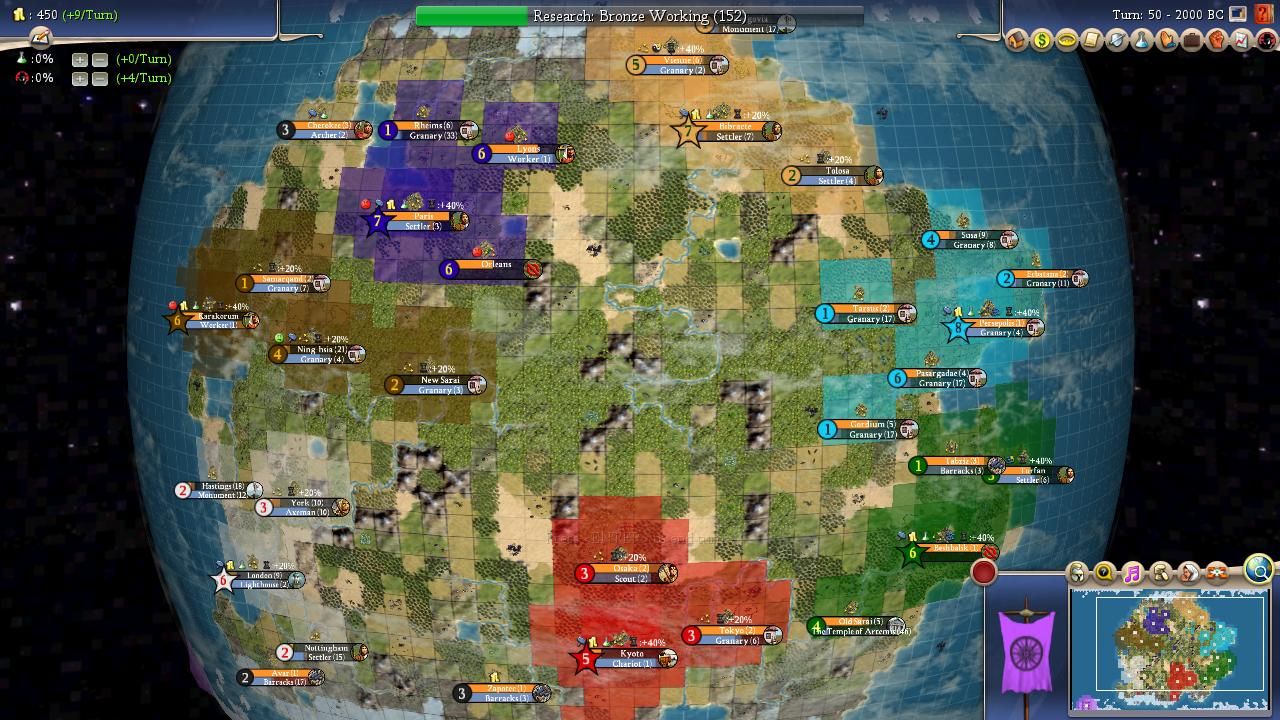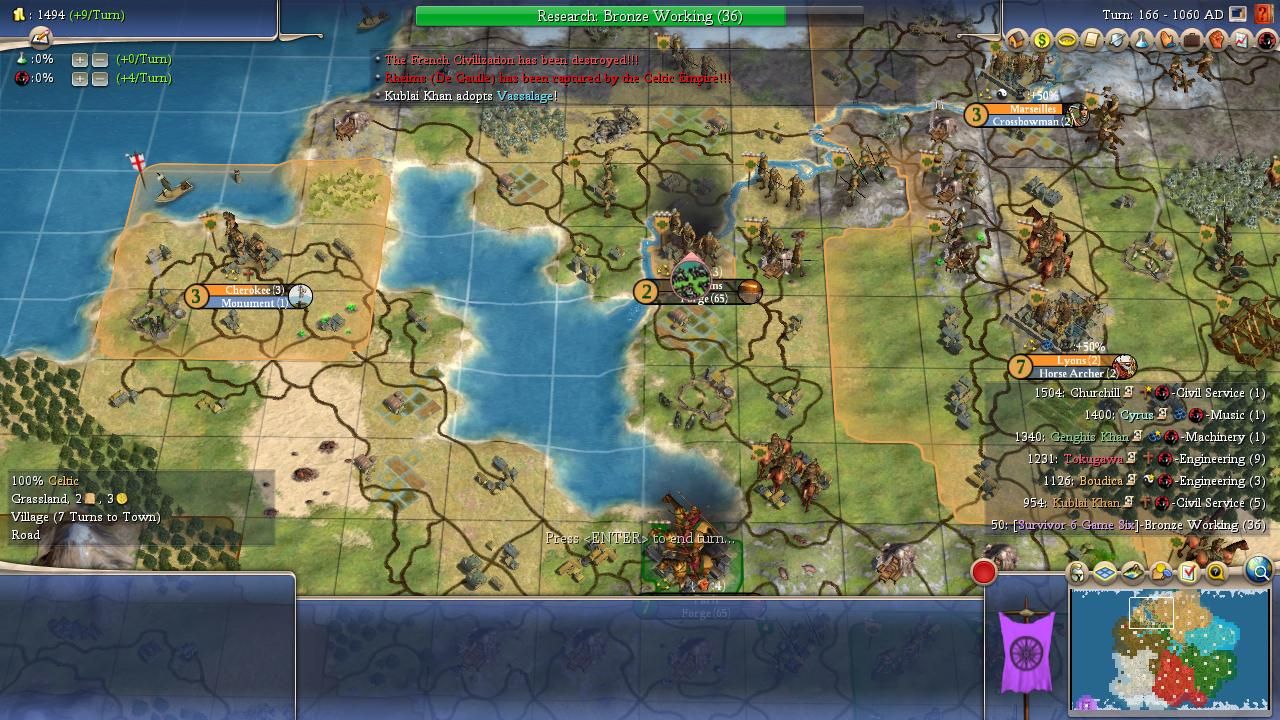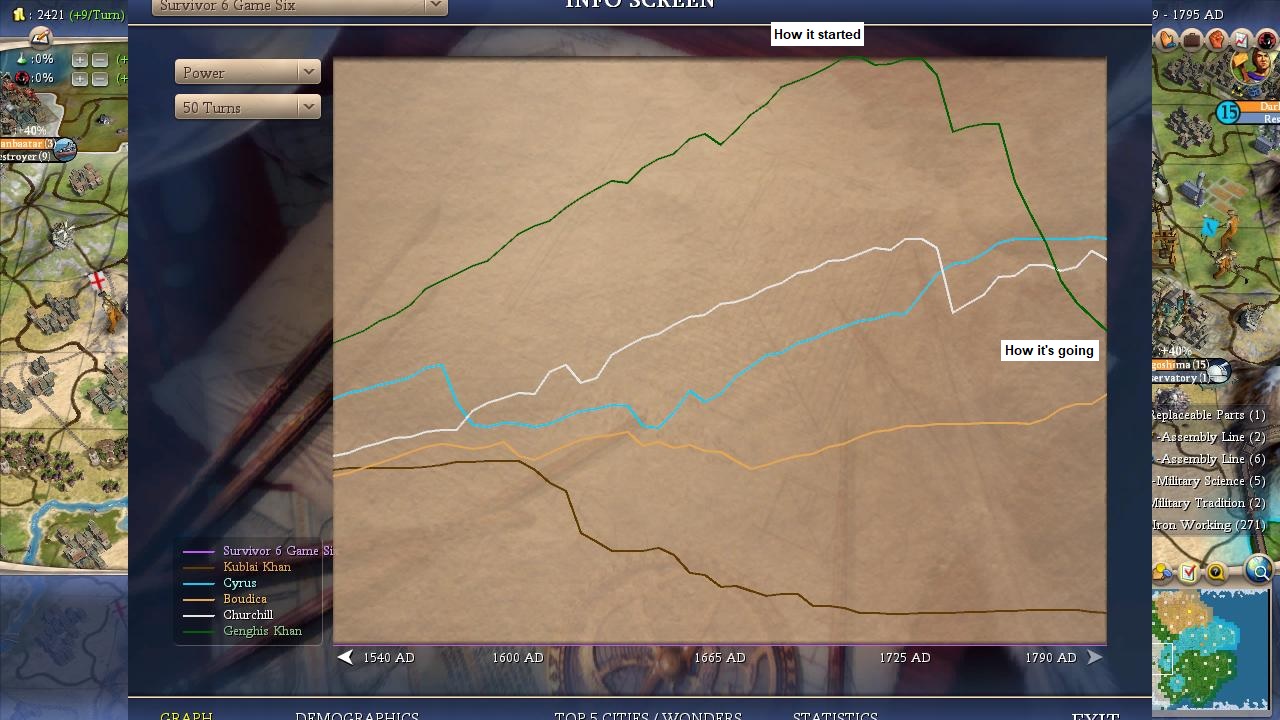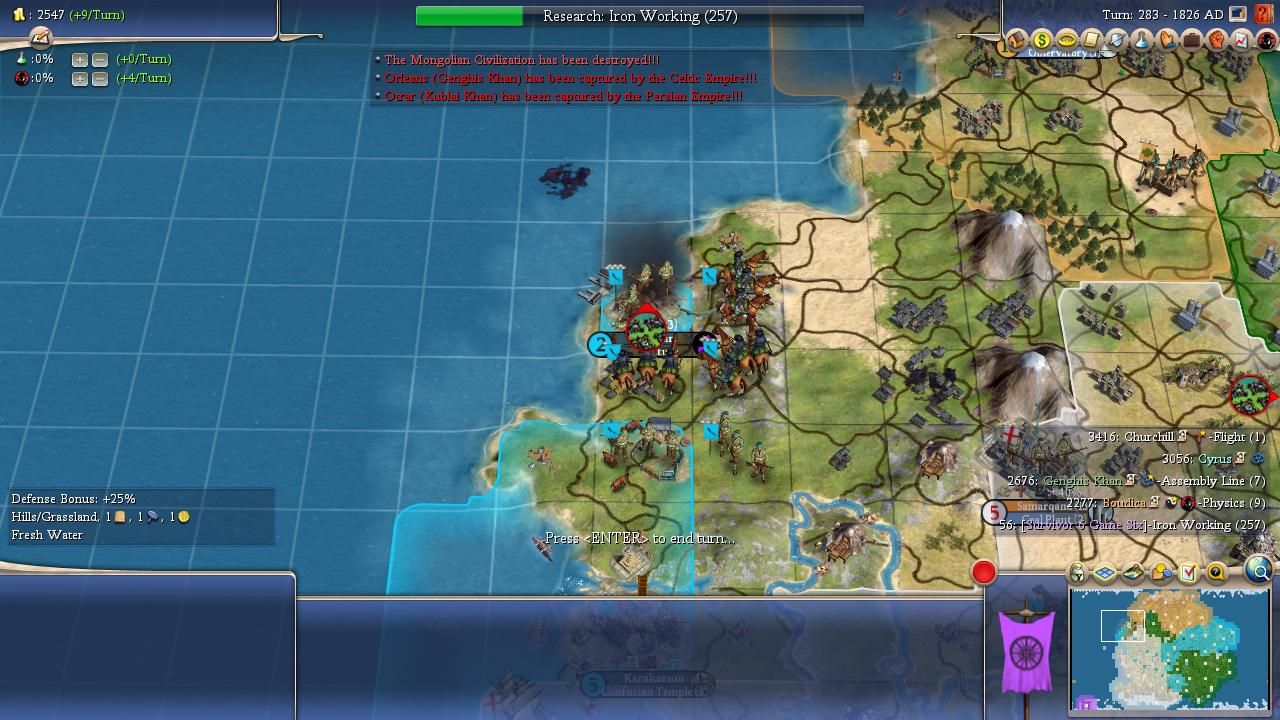


Game Six was widely perceived by the community as being completely wide open. There was no clear favorite in the picking contest as the vote was split across four or five different leaders with no obvious candidates to advance to the playoff round. The two seeded leaders (Kublai Khan and Cyrus) failed to convince the viewers that they would dominate this match and opinion was split between the two of them and Boudica and Tokugawa. The defining feature of this game looked to be the cavernously low peace weight shared by all but one leader, with everyone outside of Churchill having a peace weight of 3 or lower. This made Churchill the odd man out from a diplomatic perspective and he was a modest favorite to be First to Die in the picking contest. Everyone agreed that Churchill had a fantastic starting position for England's Fishing/Mining techs but it was a real question as to whether he could live long enough to exploit it.

Boudica was guaranteed to land the first religion since she was the only leader to start with Mysticism tech, and she opted to establish Taoism as the game's first religion on Turn 9. Unfortunately for the Celts, Boudica decided to send her starting Deity settler to the northwest and the free holy city culture largely claimed low-quality tundra tiles. This was a boon to Cyrus who otherwise could have been badly squeezed on territory and instead was able to expand out of his initial peninsula. He had double wet corn tiles at the capital plus started with Agriculture tech and along with Imperialistic trait Cyrus had the settlers flying out of his capital in the early turns. The other early religion was open to anyone who wanted it and in a surprising turn it was claimed by Genghis Khan Temujin, of all people. He picked Hinduism which popped up in a city on the eastern seaboard after the Mongol leader had chosen a weak spot for the free starting settler. This left the western side of the map with no early religion and provided an opportunity for a third faith to play a major role in the game.
The AI leaders did their usual thing in the early turns by spreading out across the map as quickly as possible. Kublai Khan suffered from a seafood-heavy capital that synergized poorly with his starting techs and then chose to send his first two settlers deep into the central jungle belt to the east. This claimed a lot of Calendar resources and land which would be useful once the rainforest could be chopped down, however in the pre-Iron Working period these settlements were almost useless and the western Mongols were left with a slow opening. Churchill and Tokugawa both raced for Stonehenge in their capitals and we ended up with a bizarre ending to the competition. Churchill was set to finish the wonder one turn ahead of Tokugawa... only to finish researching Bronze Working and revolt into Slavery civic, letting the Japanese claim the prize while they were in Anarchy. Whoops! The free monuments were a big help for Tokugawa who was expanding a bit slowly.

It was still anyone's game after 50 turns of competition with much of the central portion of the map remaining to be claimed. Cyrus was the early game score leader thanks to his expansive-friendly start and he had raced out to six cities while avoiding the potential of being cut off by Temujin's borders to the south. The biggest weakness for Cyrus was a failure to research Mysticism tech which left the Persians with no way to expand borders which would remain an issue for dozens of turns yet to come. His second city had copper in the second ring which was stolen by the green Mongol borders due to an inability to get any culture. Cyrus had also picked up Temujin's Hindu religion via a random spread across the water and these two leaders were building a solid friendship with one another. Shared faith and shared peace weight made them natural allies.
Up in the north, Boudica was struggling a bit due to her inexplicable decision to keep settling the northern icy wasteland rather than push towards the center of the map. She was also a bit unlucky in having her religion fail to spread to any of her neighbors; Cyrus had already picked up Temujin's religion and De Gaulle had nothing for the moment. The French leader was proving to be his usual incompetent self, pushing to the southeast with additional city plants but crashing his economy in the process. There was no particular reason for De Gaulle to perform badly here but he sat near the bottom of the scoreboard along with jungle-choked Kublai Khan. The western part of the map finally picked up its own faith when Churchill founded Christianity (via Monotheism) on Turn 73. With little competition from other religions, Churchill would spread Christianity in time to both of his neighbors in Tokugawa and Kublai Khan. The English would have to hope that this would be enough to stave off a diplomatic dogpile based on differing peace weight.
Outside of some conflict with barbarian cities, the game remained peaceful longer than expected with this many aggressive leaders. With the map starting to fill up and open territory nearly gone, however, it was only a matter of time until the first wars began breaking out. The action kicked off on Turn 83 with a questionable attack from De Gaulle:

The French leader was in one of the weakest positions in the game and his invasion of Japan made little strategic sense. Two axes, a spear, and a warrior had no chance of accomplishing anything and they failed to break through Tokugawa's Protective archers in Kagoshima. De Gaulle certainly did not need to be wasting production on units while fighting a war where he was never going to gain territory, not with Construction tech centuries away and the Japanese sporting walls across their cities. Tokugawa was so untroubled that his main army was even able to capture a barbarian city on his western flank while this conflict was going on. Perhaps realizing the futility of this war, De Gaulle signed a white peace treaty with Tokugawa a dozen turns later without any territory changing hands. This might have been a minor blip on the radar except that Boudica immediately invaded De Gaulle afterwards, followed by Genghis Khan also piling onto De Gaulle three turns later. The AI leaders were smelling blood in the water and going for the weakest target.
This seemed likely to result in the rapid elimination of De Gaulle and Boudica looked to be in the best position to capitalize on France's downfall. However, we were in for a surprise as Tokugawa launched an invasion of Genghis Khan that began on Turn 104 and rapidly overran the border cities of Sakae and Hovd:

Tokugawa's counterpunch against the eastern Mongols was one of the biggest turning points in the game as it reshuffled the diplomatic landscape. These were the top two leaders on the scoreboard at the time that Tokugawa launched his strike and they easily could have worked together to roll over some of the weaker civs. Instead, Tokugawa and Genghis Khan would expend their militaries in a bloody conflict that stretched on for dozens of turns without either one of them being strong enough to defeat the other. It was a wasteful, draining war that very easily could have been avoided if Tokugawa had picked a better target for his aggression. (Given the similarity of their peace weight, this war was likely driven by the randomness of where the religions happened to pop up on the map; this could have been a very different game if Tokugawa hadn't picked up Churchill's Christianity.) Meanwhile, Cyrus decided to launch his own attack against Kublai Khan, sniping one contested city in the central jungle at the outset of the war and then trading units ineffectually for dozens of turns afterwards. The core cities of Cyrus and Kublai Khan were too far away from one another to make progress at this stage of the game and Cyrus found himself stuck in his own pointless war.
Thus the wider game state found itself in a stalemate for long turns on end. The Tokugawa/Temujin and Cyrus/Kublai Khan warring pairs each weren't strong enough to defeat the other and their conflicts dragged out for long turns on end. The one conflict where one side had an advantage was Boudica's ongoing clash with De Gaulle, as the Celts slowly sieged down one city after another as French strength was sapped away. Eventually Tokugawa signed peace with Genghis Khan and the Mongol leader almost immediately jumped into a fresh war against the crippled De Gaulle. With two leaders beating on the poor French leader the pace of conquest increased significantly and it was no surprise when De Gaulle was the first to exit the game on Turn 166:

It was yet another miserable failure of a performance from De Gaulle who has been eliminated in five out of six opening games of AI Survivor. There was no particular reason for him to do so badly in this game as he had a solid capital, plenty of room to expand, and a friendly diplomatic environment. Somehow he managed to expand poorly, launch an idiotic invasion, and get dogpiled despite sharing a the same low peace weight as his neighbors - yikes. De Gaulle's territory was split between Boudica and Temujin with the bulk of the spoils going to the Celts. Boudica's land wasn't very well developed in terms of infrastructure and she had a lot of tundra within her borders but there was potential to become strong thanks to the sheer quantity of the territory that the Celts had amassed. Given some peaceful time to build, she could become one of the strongest leaders in the field. Of course, this being Boudica, she declared war on Cyrus six turns later which was a real facepalm moment.  Then Genghis Khan joined the war on the side of his Hindu buddy Cyrus, immediately plunging into conflict with his former ally Boudica. So much for any opportunity to develop the captured French lands!
Then Genghis Khan joined the war on the side of his Hindu buddy Cyrus, immediately plunging into conflict with his former ally Boudica. So much for any opportunity to develop the captured French lands!
The real winner from these endless cycles of bloodshed was Churchill. He was largely staying out of the fighting that raged everywhere else and the long stalemates across most of the world were perfect for the English. It was kind of amazing how Churchill was largely avoiding aggression from the many low peace weight leaders that surrounded him but they were just so busy smashing each other over the head that he generally escaped notice. Tokugawa did launch one invasion on Turn 144 that captured an English border city, however Churchill was able to rally back and recapture the same spot after the initial surge of Japanese units had passed. The two signed peace afterwards and it ended up being a brief war that didn't pose much of an interruption to Churchill's development. While Churchill's Protective/Charismatic trait combination wasn't especially strong from an economic perspective, the mere fact that he was at peace for ages on end while everyone else was warring left him in the driver's seat when it came to teching.
Elsewhere, the big war at the moment was Cyrus and Temujin against Boudica. Cyrus signed peace with Kublai Khan to concentrate on his Celtic opponent and the situation looked grim for Boudica as the eastern Hindu duo began rolling through her border cities. This was a golden opportunity for Cyrus to pick up most of the spoils of conquest and become the dominant power in the game since he was the other tech leader alongside Churchill. However, the game swung yet again on back to back turns. First Cyrus inexplicably signed a peace treaty with Boudica for the city of Camulodunum despite having the Celts on the ropes. Gaining a city was nice but Cyrus had already unlocked knights and was in position to gain much larger prizes by continuing the fight. Then on the very next turn Tokugawa intervened and again stabbed at the eastern Mongols:

It was the second time that Tokugawa had attacked Genghis Khan when he was in the middle of a northern conquest. Boudica was saved as the Celts were miraculously able to get another peace treaty while the Mongols turned to deal with this new threat. Boudica had taken a heavy beating and was likely out of the running for a first place finish but largely held onto her territory against all odds. As for Tokugawa, it quickly became clear that he had made a terrible mistake with this latest attack. It didn't take long for Temujin to call in his ally Cyrus, with the two of them having both reached "Friendly" status with one another thanks to shared faith and mutual military struggle bonuses, and the Hindu combo immediately began dismantling the Japanese empire. Genghis Khan had beelined Military Science tech and was running away with swarms of grenadiers while Cyrus contented himself with a knight-heavy force. There were simply too many opposing units for the Japanese to handle and their cities began falling one after the other. Cyrus snatched one city at low odds and then took the Japanese capital of Kyoto but the Mongols claimed everything else including the final kill credit:

It was a disappointing outcome for Tokugawa who had seemed to be in a good position to win at game's start. His biggest issue had been diplomacy as the randomness of war declarations hadn't lined up in his favor. Of course this was entirely Tokugawa's fault as he twice picked a war with Temujin instead of going after a softer target elsewhere on the map. Amongst the aggressive leaders on the eastern side of the map, Cyrus and Genghis Khan had been able to bond over shared religion and work together while Boudica and Tokugawa had not. (It was amazing that no one else had ever followed Boudica's Taoist religion the entire game; surely she had been unlucky in that regard.) But the net result was clear for everyone to see, Cyrus and Temujin were competing for the top spot while Tokugawa had been eliminated and Boudica was struggling to stay alive.
Cyrus might have been able to wrestle more spoils from the collapsing Japanese nation except that he had been attacked yet again by Boudica a bit earlier on Turn 226. The Celts overran the same border city that they had signed away in the previous peace treaty only to be stopped at the second Persian city as Cyrus finally reached the Rifling tech that he had been delaying. Celtic knights were no good against Persian rifles and Boudica took a heavy beating in the fighting. Everything was set up for Cyrus to go on a rampage with his rifles and cavalry against the medieval Celts... only for Cyrus to sign another peace treaty with Boudica! What in the world?!  This was twice that Cyrus had been in position to conquer his northern neighbor only to back off when everything was seemingly in his favor. It felt like a massive missed opportunity to double the size of his territory while operating with a generational tech advantage.
This was twice that Cyrus had been in position to conquer his northern neighbor only to back off when everything was seemingly in his favor. It felt like a massive missed opportunity to double the size of his territory while operating with a generational tech advantage.
But that still wasn't the dumbest decision made by an AI leader during these turns. Kublai Khan failed a sanity check and declared war against Churchill, somehow thinking that his medieval forces would be able to make a dent against an English nation that had just reached Rifling tech themselves. It turned out that no, knights and maces did not do well against redcoats, what a surprise. The brown cities of western Mongolia were shortly under siege and Churchill appeared to have a golden opportunity to acquire more territory for himself at little cost. Then a new challenger entered the fray:

Genghis Khan wanted to get in on the action as well and come to the rescue of his Mongolian kin. This was a titanic clash pitting the top two leaders on the scoreboard against one another in the battle for a potential first place finish. Temujin had the largest territory in the world along with the top military rating on the Power charts by a good margin. If he could overrun Churchill's forces it was hard to see how anyone would be able to stop the green Mongols from pushing on to an eventual Domination victory. A tidal wave of Mongol units crashed over the English border and immediately took the city of Coventry. The main Mongol stack had something like 70 units inside and soon Genghis Khan was battering at the gates of Newcastle and Nottingham, one step away from the English capital.
However, Temujin had spent basically the entire game fighting opponents and training endless units while Churchill had largely remained at peace for the last hundred turns. There was a vast gulf separating their nations in terms of internal infrastructure and that manifested itself in a significant technological edge for the English. Churchill had plenty of cavalry running around, he was about to unlock cannons, and he wasn't far off from Assembly Line for factories and the next generation of infantry. Even without reaching that point yet, Temujin ran into the unpleasant surprise of finding that his grenadiers had an attack bonus against rifles but not the English unique unit redcoats - uh oh. (EDIT: This is wrong, apparently grenadiers do get the attack bonus against redcoast. Thanks to Dp101 for the correction!) Temujin was a long distance away from Rifling tech and his military was heavy on grenadiers, cuirassiers, and catapults which all faced poor odds against redcoats and cavalry. We soon noticed that the Mongol units didn't seem to be making any additional progress, and in fact the tide of battle was swinging back towards the Mongol border. How badly was it going?

That bad.  The individual unit matchups were simply too bad for Genghis Khan and his units were getting slaughtered due to being a full era behind in military technology. The eastern Mongols were pushing for Rifling tech themselves but the English would have Assembly Line unlocked by the time that they could get there and the situation did not improve. The Mongol attack had been like the tide sweeping in, dealing a great deal of damage on the initial assault, but then pulling back and sweeping out to sea once again. By Turn 275 the English cities that had initially fallen were all back in Churchill's hands and the counterinvasion was underway. English infantry and machine guns bore the white colors of the English nation as they pushed into the Mongol-held territories of former Japan. Boudica even piled into the conflict as well and began laying siege to Temujin's cities along her border, taken from De Gaulle what felt like ages earlier. It was amazing how Genghis Khan's position had collapsed so quickly over the course of two dozen turns as his units were now in full retreat back towards the Mongol core.
The individual unit matchups were simply too bad for Genghis Khan and his units were getting slaughtered due to being a full era behind in military technology. The eastern Mongols were pushing for Rifling tech themselves but the English would have Assembly Line unlocked by the time that they could get there and the situation did not improve. The Mongol attack had been like the tide sweeping in, dealing a great deal of damage on the initial assault, but then pulling back and sweeping out to sea once again. By Turn 275 the English cities that had initially fallen were all back in Churchill's hands and the counterinvasion was underway. English infantry and machine guns bore the white colors of the English nation as they pushed into the Mongol-held territories of former Japan. Boudica even piled into the conflict as well and began laying siege to Temujin's cities along her border, taken from De Gaulle what felt like ages earlier. It was amazing how Genghis Khan's position had collapsed so quickly over the course of two dozen turns as his units were now in full retreat back towards the Mongol core.
Meanwhile, Cyrus had been Genghis Khan's closest friend throughout the game due to their shared religion. Would the Persians intervene in the fighting to save their southern ally? Not so much as it turned out: Cyrus had reached "Pleased" status with Churchill thanks to long eras of peace and friendly resource trades, and Cyrus is one of the AI leaders who won't plot war at "Pleased" relations. His programming logic prevented him from acting against Churchill. Intead, Cyrus took this opportunity to finish off the last three cities held by Kublai Khan and claim an elimination credit:

Kublai Khan was never able to do much in this game thanks to having a starting position which was ill-suited for his techs. His seafood-heavy capital could have worked well for leaders like Hannibal or Victoria (Financial leaders who start with Fishing tech) but didn't fit the Mongols in the slightest. He also made his situation worse than it had to be by settling the jungle over the more open territory to the north and put the western Mongols in a hole from which they were never able to recover. This may not have been the use of Cyrus' time, however, as this attack did little to strength his position in the game aside from scoring an extra fantasy point for himself thanks to removing a competitor.
The real story for the moment was the ongoing collapse of Genghis Khan. He had been a terrifying presence for most of this game, attacking his rivals again and again in one war after another, and now it was all falling apart thanks to lagging behind so badly in technology. This was the entirely predictable result of Temujin's own actions, of course, as his endless warring had made enemies of everyone other than Cyrus while leaving his cities underdeveloped to a ridiculous degree. It's not a coincidence that the ultra-aggressive warmongers like Genghis Khan and Ragnar and Montezuma have fared poorly across every season of AI Survivor. Back the Mongol forces fell, retreating turn after turn further and further to the east. The pace of conquest for Churchill was slow but steady, taking a new city every few turns in their inexorable march onwards. Boudica was able to grab a few cities for herself in the north along the Persian border but it was Churchill doing most of the heavy lifting, now with English tanks, and taking most of the spoils for himself. By Turn 300 the Mongols were down to their original core and another score of turns sufficed to finish them off:

Boudica rather undeservingly scored the kill credit thanks to Churchill opting to rest his main stack after capturing Beshbalik. It had been a wildly entertaining game from Genghis Khan even though he wound up getting eliminated, and with a little bit more luck on the diplomatic side of things he might have been able to overcome Churchill's technological edge to reach his desired Domination finish. It was certainly strange to have the eastern Mongols completely eliminated after having their green borders splashed all over the map for the last 200 turns. Let this be a lesson on the perils of falling behind in technology!
This had been a game of heavy warring and the rollercoaster ride hadn't stopped just yet. Churchill and Cyrus were both "Pleased" with one another and wouldn't fight their competitor barring massive spy actions plunging their relationship down to "Cautious". However, Cyrus was "Annoyed" with Boudica thanks to the Celts having invaded the Persians multiple times in the past, and we could tell that it was only a matter of time until the two clashed again. Boudica was more than a full era behind in technology as compared with Cyrus; the screenshot above showcasing the Celts on Education while the Persians were researching Industrialism pretty much summarized the situation. Cyrus was able to field tanks and gunships and paratroopers and mobile artillery while Boudia was still working with rifles and cavalry. This was a gigantic disparity in unit quality and the technological advantage immediately made itself felt when Cyrus charged across the border on Turn 326. First he picked off the Celtic conquests from Temujin along the southern border, then the Persian tank columns began pushing into the Celtic core. There was no magical peace treaty this time, nothing to save Boudica from impending destruction. Unlike in the earlier eras where the AI tends to take a long time to capture territory, it can move very quickly with the lategame toys when working with a tech edge. Boudica disintegrated in breakneck fashion and was gone a mere 15 turns later:

The unfortunate Boudica nearly managed to survive to get another shot in the Wildcard game, though it was hard to feel too sorry for her fate given that she had repeatedly attacked Cyrus in earlier eras. It will be interesting to see how she fares in alternate history replays of this map when Boudica doesn't have the terrible luck to get zero spreads of her religion. As for Cyrus, this rapid conquest brought him into near-parity with Churchill in all of the major Demographics categories. He was a little bit behind in everything: population, territory, research speed, etc. If he had been able to overrun Boudica at an earlier date, particularly when the Persians had the rifle/cav advantage against medieval opposition, it probably would have been enough to deliver him the victory. But Cyrus was simply too far behind at this point, about 3-4 techs behind on the tree, and there was no way that he could make up that difference with both sides refusing to fight one another. They each built their respective spaceships over the concluding turns of this game, Churchill launched about a dozen turns earlier than Cyrus, and when the English spaceship landed in Alpha Centauri, that was it:

The late finishing date reflected the slow tech pace of this game, with Churchill having lousy economic traits and everyone else too busy fighting to focus on research. It was a great showing from Churchill who had taken advantage of the fortunate breaks that had gone his way throughout the match. He avoided any early attacks as De Gaulle pulled Tokugawa into a mutual conflict and then Kublai Khan was attacked by Cyrus, leaving Churchill free to develop in peace. Founding his own religion at the somewhat late date of Monotheism held its own dangers but Churchill was able to get Christianity established as the main religion of both neighbors and that surely helped him stay safe. When the attacks did come later in the game, he was able to push back Tokugawa and get a quick treaty, then have enough of a tech edge to defeat Genghis Khan in the culminating war of the game. Churchill did not pull a Willem and actually did research Rifling at a reasonable pace (faster than Cyrus who avoided it for ages) which allowed him to have redcoats and cavalry already in place to push back the dual Mongol attacks from Kublai and Genghis Khan. He absolutely had good luck break his way on the diplomatic front but nevertheless played an excellent game and was a deserving winner.
As a result, Churchill and Cyrus will move on to the playoff round and get another shot against a new set of competitors. This should be a wild game to rerun in the alternate histories and it will be fun to see how things might have played out differently after the season concludes. Until then, thanks again for following along with this season of AI Survivor!



